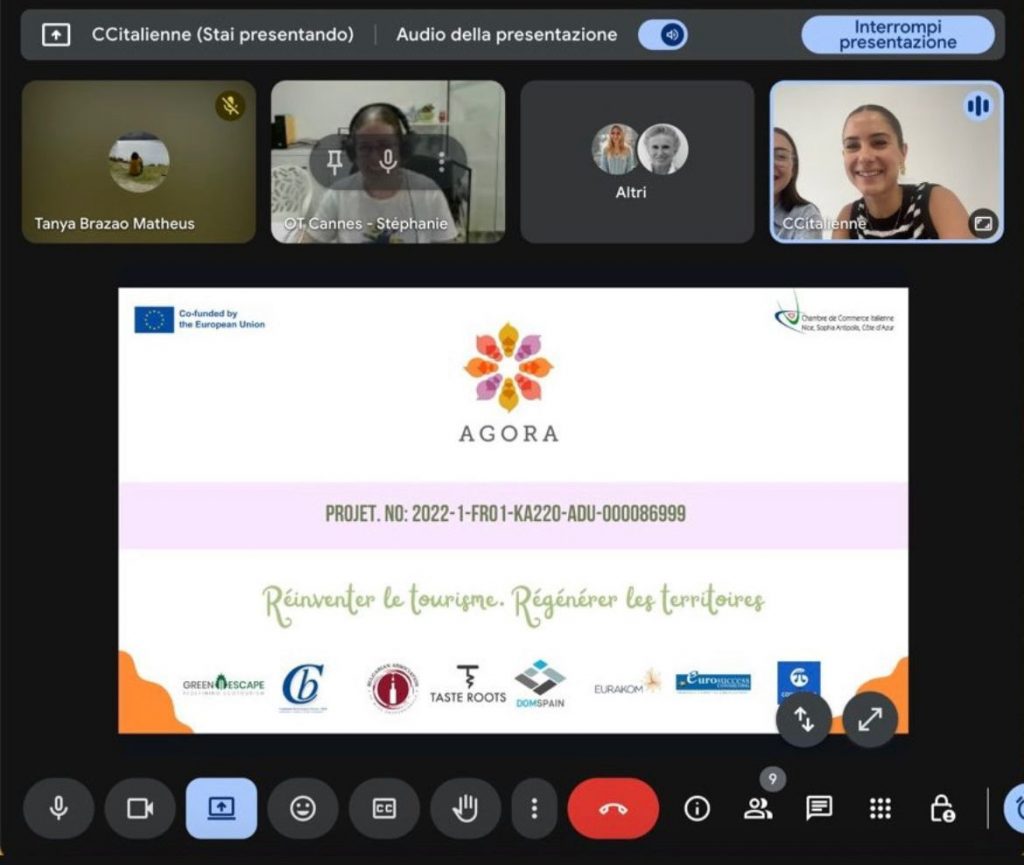The AGORA project seeks more than incremental improvements in tourism — its ambition is regenerative transformation. On September 3rd, this ambition was put into practice during the online workshop hosted by the Italian Chamber of Commerce in Nice. The aim was to co-create tools, strategies, and proposals that can be locally grounded, scalable, and deeply regenerative.
Ten professionals took part, representing the tourist offices of Cannes, Juan-les-Pins, Villefranche, Menton-Riviera-Merveilles, Vallauris, and Skål International Côte d’Azur. Their diverse perspectives, spanning management, promotion, and community engagement, enriched the exchanges and allowed for a wide range of viewpoints.
The workshop began by aligning on the shared vision of regenerative tourism: not just doing “less harm” but actively generating positive outcomes for people, culture, and landscapes. This provided the foundation for exploring concepts such as carrying capacity, circular economy, and responsible tourism, all of which were treated as essential for a common language. Participants then reviewed and enriched the draft training modules prepared within the AGORA framework. These include themes such as sustainable resource use, immersive and regenerative experiences, the meaningful role of local communities, and the use of digital technologies for communication and promotion.
The group also explored interactive tools, including the AGORA map, which gathers inspiring case studies from across Europe and beyond, and methodologies such as Empathy Mapping and Experience Journey Mapping. Through these exercises, participants redesigned an existing tourist product with a regenerative perspective and sketched new visitor journeys that integrate heritage, environmental sensitivity, and community benefits.
From these activities, two strong proposals emerged. One reframed existing offers in terms of slow tourism, storytelling, and stronger links with artisans and ecosystems, moving away from quantity toward depth and authenticity. The other envisioned new thematic trails highlighting local identity, environmental education, and regenerative practices such as waste reduction and energy saving.
Challenges identified included balancing visitor numbers with environmental and social carrying capacity, ensuring local communities benefit, integrating new technologies without losing authenticity, and mobilizing financial and policy support. At the same time, participants pointed to opportunities such as increasing demand for meaningful sustainable travel, potential for cross-regional cooperation, and the power of digital tools to amplify impact and share best practices.
The workshop concluded with collective reflection and interactive questionnaires that helped surface both common concerns and shared ambitions. It also confirmed the value of collaboration across institutions, communities, and professionals to build a regenerative approach to tourism. Similar workshops are being organized by each partner country, and the resulting proposals will be published on the AGORA website, forming a shared body of resources for all actors in the tourism sector.
This initiative marks a step forward from theory to practice, from intentions to prototypes, and from isolated actions to common frameworks. AGORA is not only about imagining regenerative tourism — it is about enabling it.

